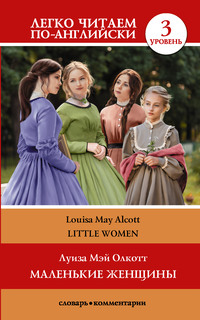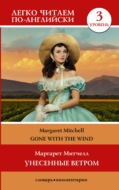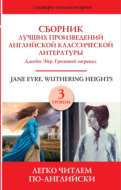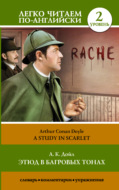Kitobni o'qish: «Маленькие женщины / Little Women. Уровень 3»
© Миронова О. В., адаптация текста, комментарии, словарь, 2021
© ООО «Издательство АСТ», 2021
Part I
Chapter one
Playing pilgrims
“Christmas won't be Christmas without any presents,” grumbled Jo, lying on the rug.
“It's so dreadful to be poor!” sighed Meg, looking down at her old dress.
“I don't think it's fair for some girls to have plenty of pretty things, and other girls nothing at all,” added little Amy, with an injured sniff.
“We've got Father and Mother, and each other,” said Beth from her corner.
Nobody spoke for a minute; then Meg said, “You know the reason Mother proposed not having any presents this Christmas was because it is going to be a hard winter for everyone; and she thinks we ought not to spend money for pleasure, when our men are suffering at war.”
“But I don't think the little we should spend would do any good. We've each got a dollar. The army wouldn't be much helped by our giving that. I agree not to expect anything from Mother or you, but I do want to buy Undine and Sintran for myself. I've wanted it so long,” said Jo, who was a bookworm.
“I planned to spend mine on new music,” said Beth, with a little sigh.
“I shall get a nice box of drawing pencils; I really need them,” said Amy decidedly.
“Mother didn't say anything about our money. Let's each buy what we want, and have a little fun; I'm sure we work hard enough to earn it,” cried Jo.
“I know I do – teaching those tiresome children nearly all day, when I'm longing to enjoy myself at home,” began Meg, in the complaining tone again.
“You don't have half such a hard time as I do,” said Jo. “How would you like to be shut up1 for hours with a nervous old lady, who is never satisfied, and worries you till you're ready to cry?”
“I think washing dishes and keeping things tidy is the worst work in the world. It makes me cross, and my hands get so stiff, I can't practice well at all.” Beth looked at her rough hands with a sigh.
“I don't believe any of you suffer as I do,” cried Amy. “You don't have to go to school with girls, who laugh at your dresses, and label your father if he isn't rich, and insult you when your nose isn't nice.”
“Don't peck at one another, children. Even though we do have to work, we make fun of ourselves, and are a pretty jolly set, as Jo would say.”
“Jo does use such slang words!” observed Amy.
Jo immediately sat up, put her hands in her pockets, and began to whistle.
“Don't, Jo. It's so boyish!”
“That's why I do it.”
“I detest rude, unladylike girls!”
“I hate affected, niminy-piminy chits!”
“Birds in their little nests agree,” sang Beth, the peacemaker, with such a funny face that both sharp voices softened to a laugh, and the “pecking” ended for that time.
“Really, girls, you are both to be blamed,” said Meg, beginning to lecture in her elder-sisterly fashion. “You are old enough to behave better, Josephine. You should remember that you are a young lady.”
“I'm not! I hate to think I've got to grow up, and be Miss March, and wear long gowns! It's bad enough to be a girl, anyway, when I like boy's games and work and manners! I'm dying to go and fight with Papa, but I can only stay home and knit, like an old woman!”
Jo shook the blue army sock till the needles rattled like castanets, and her ball bounded across the room.
“As for you, Amy,” continued Meg, “you are altogether too prim. I like your nice manners and refined ways of speaking, when you don't try to be elegant. But your absurd words are as bad as Jo's slang.”
“If Jo is a tomboy and Amy a goose, what am I, please?” asked Beth.
“You're a dear, and nothing else,” answered Meg warmly, and no one contradicted her.
We will take this moment to give the reader a little sketch of the four sisters. Margaret, the eldest of the four, was sixteen, and very pretty, with large eyes and soft brown hair. Fifteen-year-old Jo was very tall, thin, and brown. She had sharp, gray eyes, which appeared to see everything. Her long, thick hair was usually bundled into a net. Elizabeth, or Beth, as everyone called her, was a rosy, smooth-haired, bright-eyed girl of thirteen, with a shy manner and a timid voice. Her father called her ‘Little Miss Tranquility'. Amy, though the youngest, was a most important person, in her own opinion at least. Pale and slender, with blue eyes, and yellow hair curling on her shoulders, she was carrying herself like a young lady mindful of her manners.
The clock struck six and Beth put a pair of slippers down to warm. The sight of the old shoes had a good effect upon the girls – it reminded them that Mother was coming.
“They are quite worn out. Marmee2 must have a new pair.”
“I thought I'd get her a pair with my dollar,” said Beth.
“No, I shall!” cried Amy.
“I'm the oldest,” began Meg, but Jo cut in with a decided, “I'm the man of the family3 now Papa is away, and I shall provide the slippers.”
“I'll tell you what we'll do,” said Beth, “let's each get her something for Christmas, and not get anything for ourselves.”
“What will we get?” exclaimed Jo.
Everyone thought for a minute, then Meg announced, “I shall give her a nice pair of gloves.”
“Army shoes, best to be had,” cried Jo.
“Some handkerchiefs, all hemmed,” said Beth.
“I'll get a little bottle of cologne. She likes it, and it won't cost much, so I'll have some left to buy my pencils,” added Amy.
“How will we give the things?” asked Meg.
“Put them on the table, and bring her in and see her open them.” answered Jo.
“Glad to find you so merry, my girls,” said a cheery voice at the door, and the girls turned to welcome their Mother. She was not elegantly dressed, but a noble-looking woman.
“Well, dearies, how have you got on today? There was so much to do, getting the boxes ready to go tomorrow, that I didn't come home to dinner. Has anyone called, Beth? How is your cold, Meg? Jo, you look tired to death. Come and kiss me.”
Mrs. March got her wet things off and put her warm slippers on. She sit down in the easy chair4, and drew Amy to her lap.
As they gathered about the table, Mrs. March said, “I've got a treat for you after supper.”
A quick, bright smile went round like a streak of sunshine. Beth clapped her hands. Jo tossed up her napkin, crying, “A letter! A letter! Three cheers for Father!”
“Yes, a nice long letter. He is well, and sends all sorts of loving wishes for Christmas, and a special message to you girls,” said Mrs. March.
“Hurry, Amy!” cried Jo, choking on her tea and dropping her bread, butter side down, on the carpet in her haste to get at the treat.
“When will he come home, Marmee?” asked Beth, with a little quiver in her voice.
“Not for many months, dear, unless he is sick. He will stay and do his work faithfully as long as he can. Now come and hear the letter.”
Bepul matn qismi tugad.








